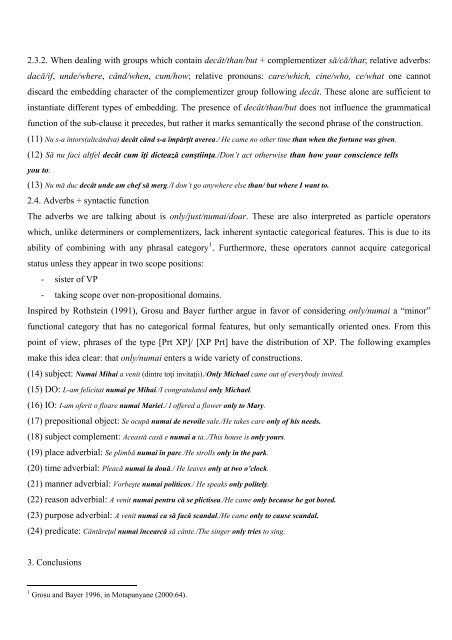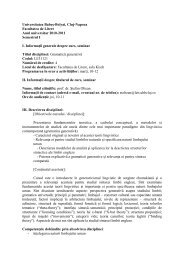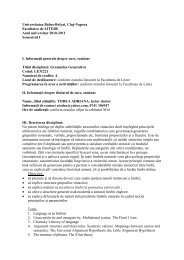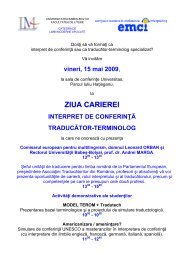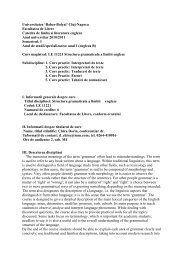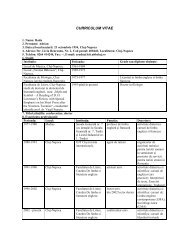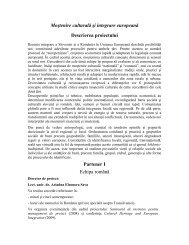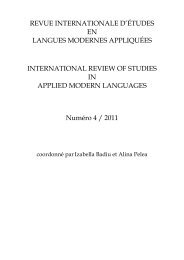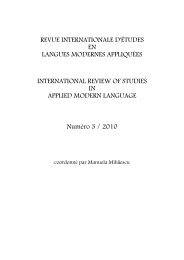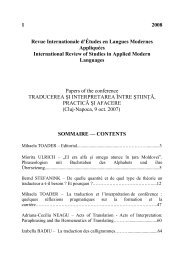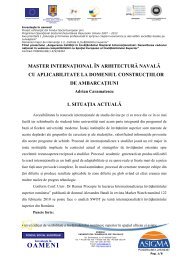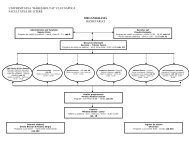Dimensiuni ale limbajului n context carceral
Dimensiuni ale limbajului n context carceral
Dimensiuni ale limbajului n context carceral
You also want an ePaper? Increase the reach of your titles
YUMPU automatically turns print PDFs into web optimized ePapers that Google loves.
2.3.2. When dealing with groups which contain decât/than/but + complementizer să/că/that; relative adverbs:<br />
dacă/if, unde/where, când/when, cum/how; relative pronouns: care/which, cine/who, ce/what one cannot<br />
discard the embedding character of the complementizer group following decât. These alone are sufficient to<br />
instantiate different types of embedding. The presence of decât/than/but does not influence the grammatical<br />
function of the sub-clause it precedes, but rather it marks semantically the second phrase of the construction.<br />
(11) Nu s-a întors(altcândva) decât când s-a împărţit averea./ He came no other time than when the fortune was given.<br />
(12) Să nu faci altfel decât cum îţi dictează conştiinţa./Don’t act otherwise than how your conscience tells<br />
you to.<br />
(13) Nu mă duc decât unde am chef să merg./I don’t go anywhere else than/ but where I want to.<br />
2.4. Adverbs + syntactic function<br />
The adverbs we are talking about is only/just/numai/doar. These are also interpreted as particle operators<br />
which, unlike determiners or complementizers, lack inherent syntactic categorical features. This is due to its<br />
ability of combining with any phrasal category 1 . Furthermore, these operators cannot acquire categorical<br />
status unless they appear in two scope positions:<br />
- sister of VP<br />
- taking scope over non-propositional domains.<br />
Inspired by Rothstein (1991), Grosu and Bayer further argue in favor of considering only/numai a “minor”<br />
functional category that has no categorical formal features, but only semantically oriented ones. From this<br />
point of view, phrases of the type [Prt XP]/ [XP Prt] have the distribution of XP. The following examples<br />
make this idea clear: that only/numai enters a wide variety of constructions.<br />
(14) subject: Numai Mihai a venit (dintre toţi invitaţii)./Only Michael came out of everybody invited.<br />
(15) DO: L-am felicitat numai pe Mihai./I congratulated only Michael.<br />
(16) IO: I-am oferit o floare numai Mariei./ I offered a flower only to Mary.<br />
(17) prepositional object: Se ocupă numai de nevoile s<strong>ale</strong>./He takes care only of his needs.<br />
(18) subject complement: Această casă e numai a ta../This house is only yours.<br />
(19) place adverbial: Se plimbă numai în parc./He strolls only in the park.<br />
(20) time adverbial: Pleacă numai la două./ He leaves only at two o’clock.<br />
(21) manner adverbial: Vorbeşte numai politicos./ He speaks only politely.<br />
(22) reason adverbial: A venit numai pentru că se plictisea./He came only because he got bored.<br />
(23) purpose adverbial: A venit numai ca să facă scandal./He came only to cause scandal.<br />
(24) predicate: Cântăreţul numai încearcă să cânte./The singer only tries to sing.<br />
3. Conclusions<br />
1 Grosu and Bayer 1996, in Motapanyane (2000:64).


